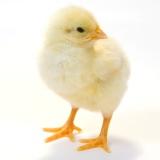New prebiotic insight – protecting birds from Salmonella

Studies are currently underway to investigate the use of galacto-oligosaccharide prebiotics to protect animals from Salmonella infection and other food poisoning bacteria.
Replacing antibiotics
The sugars, called galacto-oligosaccharides, and are already known to improve the health of breast-fed infants. Researchers are now looking at using these prebiotics in place of antibiotics in poultry and livestock to reduce the chances of Salmonella bacteria damaging the gut during a food poisoning episode, reducing the overall damage and severity of the infection.
“Antibiotics are used to treat particularly severe Salmonella infections,†says Laura Searle from the Veterinary Laboratories Agency in the UK. “But their effectiveness has been undermined by their systematic use both as growth promoters in animals and as therapeutic agents, which has been implicated in widespread antibiotic resistance. In an attempt to overcome this problem the EU banned the use of antibiotics as growth promoters in 2006, so now alternatives are urgently being investigated.â€
How it works
One possibility is to use prebiotics made from natural complex sugars that are already known to improve gastrointestinal health. There have been many theories put forward about the way they actually work, including the suggestion that they may stimulate our natural gut bacteria to multiply, allowing them to fight off invading pathogens trying to colonise.
The Veterinary Laboratories Agency has initiated a project to demonstrate the exact mechanism for the apparent success of a novel galacto-oligosaccharide mixture. Their studies have now shown that the specific mixture protects animals from infection by reducing the invasion capabilities of Salmonella, and lowering the seriousness of disease symptoms. After treatment with this mixture, fewer Salmonella bacteria were found in systemic and intestinal tissues.
Used on farm level
“The next step will be to see if the novel galacto-oligosaccharide mixture can be used in farm livestock successfully, and whether it is still as effective when given before a Salmonella infection, protecting the animals in advance. We also need to see if it can protect against other pathogens,†Searle continues.
Veterinary scientists hope that their tests will prove whether it is actually successful in farm animals, reducing gastrointestinal infections, improving animal health and cutting economic losses. The scientists need to now discover the exact mechanisms by which the sugars work.
Related link:
Veterinary Laboratories Agency











